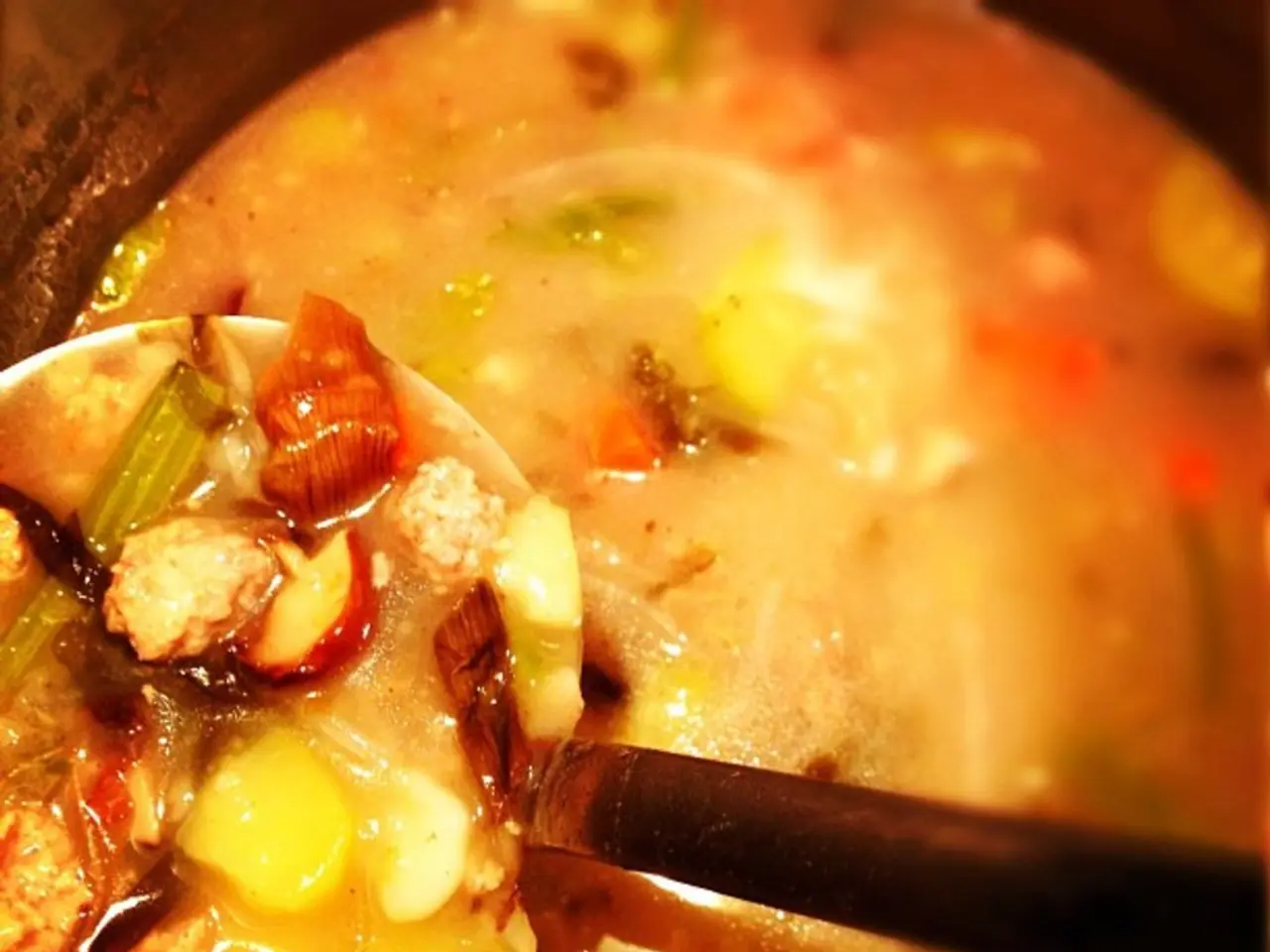Thai street food's influence in drawing tourists through soft power
Thailand's Street Food: A Culinary and Economic Powerhouse
Thailand's vibrant street food scene is not just a cultural showcase, but a strategic tool for the country's soft power and economic growth. The Thai government has been leveraging its unique culinary heritage to attract tourists and increase its global appeal [1][2].
The Bangkok Metropolitan Administration, in collaboration with the Ministry of Public Health's Department of Health Promotion, has implemented safety standards such as the 'Clean Food, Good Taste' campaign and 'SAN Plus' to control food safety in street food vendors [4]. Initiatives like the "One Village, One Thai Chef" program have trained over a thousand culinary professionals, enhancing quality, hygiene, and service standards in food offerings [2][3].
Thailand aims to be the Kitchen of the World, believing that the ingredients from Thailand, the menu, and the restaurants produce the attraction for tourists. The government promotes Thai cuisine as part of its broader "5Fs" soft power framework (Food, Film, Fashion, Festivals, Fighting), positioning food as both a symbol of national identity and as a creative cultural asset that captivates the world’s attention [1][2].
Bangkok was ranked the world's second-best city for food by Time Out, up from sixth place the previous year [5]. The Thai capital boasts a diverse street food scene, with Banthat Thong Street in Ratchathewi District being a popular culinary hotspot, known for offering a wide variety of local delicacies [6].
To ensure food safety for tourists, the government has introduced the 'Mass Catering' certification for street food vendors, restaurants, and hotels. This certification is adapted from GMP (Good Manufacturing Practices) standards, ensuring proper hygiene and food safety, particularly when serving large groups [4]. In response to post-pandemic challenges, the Government has launched initiatives to train culinary ambassadors [7].
The Thai government’s tourism strategies emphasize value-driven tourism incorporating the charm and safety of Thai street food, complementing efforts to diversify Thailand’s tourism beyond traditional party hotspots [4]. Today, 53% of international tourists now view Thailand as a "distinctive culinary destination", placing it second only to Japan in global perception [8].
Angela Rowland, another UK visitor, praises the food's quality, affordability, cleanliness, and hygiene. Naphatsorn Sirapiromsopon, who runs a mango sticky rice stall, emphasizes freshness and consistency as key to attracting tourists [6]. Phuong Uyen, a Vietnamese visitor, often walks and eats around the same area during her visits, and her favorite dish is crab rice [6].
Anna Robinson, a British tourist, finds the food in Bangkok's street scene cool and offers a variety of options. She particularly likes Pad Thai and mango sticky rice [2]. Supawan Teerarat, president of Thailand's National Food Institute, states that street food exemplifies the country's soft power by allowing tourists to explore the local charm of the destination [1].
Subsidies are available through a mutual fund to support small businesses in improving their food safety practices [1]. Professional chefs can help create more of the cuisine for visitors and the audience across the world. The Thai MasterChef program has developed 50 authentic Thai recipes and a 250-hour training course [9]. The first cohort of 1,300 chefs has already completed the program over the past four to five months, with a target of 70,000-75,000 chefs by 2027 [9].
In conclusion, Thailand's strategic use of street food as soft power is a testament to the country's commitment to cultural preservation and economic growth. By combining traditional wisdom with modern practices, Thailand ensures safe, authentic, and innovative street food experiences for visitors, making it a must-visit destination for food lovers worldwide.
References: [1] The Diplomat. (2022). Thailand’s Soft Power Strategy: From Nostalgia to Creativity. Retrieved from https://thediplomat.com/2022/04/thailands-soft-power-strategy-from-nostalgia-to-creativity/ [2] The Nation Thailand. (2022). Thailand's Soft Power Strategy: Food, Film, Fashion, Festivals, Fighting. Retrieved from https://www.nationthailand.com/news/30416382 [3] Bangkok Post. (2022). One Village, One Thai Chef Program Boosts Culinary Expertise and Safety Practices. Retrieved from https://www.bangkokpost.com/thailand/general/2115865/one-village-one-thai-chef-program-boosts-culinary-expertise-and-safety-practices [4] The Straits Times. (2022). Thailand's Soft Power Strategy: Embracing Value-Driven Tourism. Retrieved from https://www.straitstimes.com/asia/se-asia/thailands-soft-power-strategy-embracing-value-driven-tourism [5] Time Out. (2022). The World's 50 Best Cities for Food in 2022. Retrieved from https://www.timeout.com/travel/the-worlds-50-best-cities-for-food-in-2022 [6] The Jakarta Post. (2022). Bangkok's Street Food Scene: A Culinary Delight. Retrieved from https://www.thejakartapost.com/travel/2022/04/20/bangkoks-street-food-scene-a-culinary-delight.html [7] The Bangkok Post. (2021). Government Launches Initiatives to Train Culinary Ambassadors. Retrieved from https://www.bangkokpost.com/thailand/general/2083032/government-launches-initiatives-to-train-culinary-ambassadors [8] The Nielsen Company. (2021). Global Perception of Thailand as a Culinary Destination. Retrieved from https://www.nielsen.com/th/en/insights/article/2021/global-perception-of-thailand-as-a-culinary-destination/ [9] The Nation Thailand. (2022). Thai MasterChef Program Develops Authentic Thai Recipes and Training Course. Retrieved from https://www.nationthailand.com/news/30416385
- Thailand's strategic use of its culinary heritage, such as street food, is a significant tool in its soft power and international tourism, boosting the country's economy and global appeal.
- The government's tourism strategies aim to diversify Thailand's tourism beyond party hotspots, emphasizing the value-driven tourism that includes the charm and safety of Thai street food.
- The Thai government has introduced certifications like 'Mass Catering' to ensure food safety for tourists, adapting Good Manufacturing Practices (GMP) standards for street food vendors, restaurants, and hotels.
- Thailand's street food scene, with diverse offerings like Banthat Thong in Ratchathewi District, attracts food lovers worldwide, making it a must-visit destination.
- The Thai MasterChef program, developed by professional chefs, aims to train 70,000 chefs by 2027, creating more authentic Thai cuisine experiences for visitors and audiences across the world.




